
Nationals MP and former Deputy Prime Minister Barnaby Joyce has issued a stark warning to Australians about the potential risks posed by artificial intelligence (AI), particularly in relation to remote work. His remarks come as debates intensify over workplace flexibility and the growing role of AI in replacing manual tasks.
Push for Remote Work Gains Momentum
The Australian Services Union announced on Monday its intention to lodge a submission with the Fair Work Commission, advocating for greater accessibility to remote work. Union Secretary Emeline Gaske emphasized that working from home should now be considered a permanent aspect of the modern Australian workplace.
“Working from home is now a permanent feature of the modern Australian workplace, and our submission will make it clear that the location of work does not diminish its value,” Gaske stated. The union is also pushing for a mandatory six-month notice period for employees if their employers require them to return to the office.
AI’s Looming Job Threat: Barnaby Joyce Speaks Out
Despite the union’s stance, Barnaby Joyce has criticized the growing trend of remote work, calling it “an absurdity.” He warned that working from home could make employees more replaceable by AI-powered automation. “You can’t just say you’re going to work from home today, or you won’t have a job,” Joyce told Sunrise. “I think you’ve got to be careful. With AI coming: if your job is a keyboard, yourself, and a computer, it’s not a myth: AI is coming.”
Joyce highlighted blue-collar jobs such as electricians, plumbers, and carpenters as less vulnerable to the impacts of AI due to their hands-on nature. “AI won’t be able to turn itself into a plumber or an electrician. It replaces people but it doesn’t have hands and feet—think about it.”
Industry Sectors at Risk
Social Services Minister Tanya Plibersek also weighed in on the risks posed by AI, identifying repetitive clerical jobs like data entry and bookkeeping as the most vulnerable. “What we need to do is make sure that there are good jobs available for Australians in new and emerging industries as well,” Plibersek said. “We’ve got real capacity to develop some of those AI tools right here.”
According to research by Victoria University, nearly one-third of all jobs in Australia could eventually be handled by AI. Roles involving manual or service-oriented tasks in industries like cleaning, hospitality, and skilled trades were deemed less likely to be replaced by machines.
The Future of Work
Barney Glover, commissioner at Jobs and Skills Australia, offered a nuanced perspective on AI’s growing influence. “While some bleak predictions of mass redundancies are overstated, the overarching message is that almost all occupations will be augmented by AI,” he explained. “It doesn’t make a difference which sector you are in or at what skill level: you will be influenced by AI.”
The federal government’s upcoming productivity roundtable in Canberra is expected to put AI and workforce transformation at the forefront of discussions. With 46% of Australians currently working from home, according to Roy Morgan Research, this issue is likely to remain a contentious topic in the months to come.






